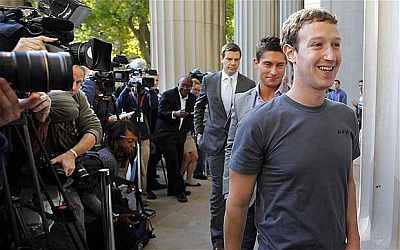 | « Back to article | Print this article |
Here's a picture perfect ending for Insta-millionaire
Is it possible that photos that look like they came out of your parents' wedding album are worth $1 billion dollars?
Facebook certainly thinks so, considering they forked out exactly that amount for Instagram, a free photo sharing mobile phone program -- called an app -- that allows you to click a photo, apply a digital filter to it, and then share it with your friends. This is an astounding purchase for a few reasons.
One, Facebook is just weeks away from its IPO which would give the social networking site 'free' cash to go on a shopping spree. Second, Instagram is just under two years old, makes no money and has around 12 employees.
Yet, the founder of Instagram, 28-year-old Kevin Systrom, has made an unlikely star out of the company because he's managed to tap into a common obsession amongst us humans -- the need to lose ourselves in the magical realm of photos.
Click NEXT to read more...
Here's a picture perfect ending for Insta-millionaire
Systrom, a self-confessed 'nerd,' didn't dream this up overnight, or figure out a market opportunity through a fancy analytics program coded by himself -- logical conclusions given his Stanford pedigree amongst other things.
He was a genuine photo lover while in the Boston-area high school that he attended, where he earnestly hoped that photography could "inspire others to look at the world in a new way,'' according to newspaper accounts.
Yet, for all of the artistic or humanitarian trappings of such a statement, Systrom worshipped at the altar of the microprocessor and was someone who received his first computer at the age of twelve, just about the time the browser wars between Netscape's Navigator and Microsoft's Explorer were reaching fever pitch.
Navigator was a later model of the world's first browser, Mosaic, invented by Marc Andreessen who also gifted the world the ubiquitous, client-end programming language Java while Systrom was just about hitting puberty.
Click NEXT to read more...
Here's a picture perfect ending for Insta-millionaire
Systrom, whose mother worked for the job site Monster.com, loaded up on programming classes in high-school, studied engineering at Stanford, interned at Odeo, a podcasting company where Twitter was born, and declined an offer to join Mark Zuckerberg at Facebook while still in college -- so it's not altogether shocking that he's gotten to where he is.
Yet, one account lays his current success at the feet of the seminal first-person, shooter video game Doom II, known for its gory violence and Satanic imagery. "I credit Doom II for everything... Doom II all the way,'' he said in an interview posted on Youtube, giving gaming addicts languishing in dead-end jobs some hope.
His blue-chip resume in the new and improved world of internet ideas continued to build after Systrom graduated from Stanford.
Click NEXT to read more...
Here's a picture perfect ending for Insta-millionaire
He joined Google as a product developer and his next stop was Nextstop, a trip-recommendation site that Facebook eventually bought for $2.5 million.
Apparently, Systrom loved bourbon and coffee so much he decided to launch a site called Burbn with fellow Stanford alum Mike Krieger, where he peddled none of the abovementioned things but a variety of other stuff such as photos, and a flight check-in ability.
The photos endured and Burbn morphed into Instagram, attracting $500,000 in venture funding from a few players, including none other than the internet icon Marc Andressen's firm, Andreessen Horowitz.
When a subsequent, more refined version of Instagram went live in the App store -- with its hi-res photos, new filters and instant tilt-shift -- it set the world on fire.
Here's a picture perfect ending for Insta-millionaire
A tsunami of users began flooding the site -- from one million users in January 2011, to 15 million in December 2011, to 30 million today. VC's began injecting more cash into it, valuing the company at $25 million.
Then things started to develop at warp speed. Apparently, in the first week of April, Instagram managed to raise $50 million in additional venture money that valued the company at a staggering $500 million.
That's when Facebook jumped in and snapped it up, making the VC's from the last funding round the quickest pile of cash they could ever imagine and bestowing upon the man who once turned Zuckerberg down, a cool $400 million dollar stake.
So, why does Zuckerberg want Instagram so badly? Facebook may be an internet leviathan with 250 million images uploaded daily but it sucks in the mobile department.
Click NEXT to read more...
Here's a picture perfect ending for Insta-millionaire
Today, the social network reportedly has no revenues from mobile despite it being the fastest growing category for the company. Its cumbersome iPhone app has six screens that a user has to go through before she can actually take a picture.
Experts say that in a few years, there will be more people on the net via mobile devices than computers. When this happens, Facebook will be a giant whale cast adrift on a very dry shore.
Instagram gives Facebook an instant network of 30 million-and-growing, devoted followers along with a robust mobile app, as well as a seasoned team of mobile-app developers.
Click NEXT to read more...
Here's a picture perfect ending for Insta-millionaire
Zuckerberg was probably salivating when he realised that Instagram has the highest ratio of employees to users -- one for every 2.07 million fans, which is an incredibly efficient number.
Moreover, in the app world, successful ones are able to scale phenomenally with very little engineering effort, adding one million users overnight if they need to.
Zuckerberg also probably realised he had a pretty good deal on his hands -- an acquisition price of $28 per Instagram user, according to Wired magazine, versus a median of $92 for the industry.
Click NEXT to read more...
Here's a picture perfect ending for Insta-millionaire
Yet, today's Netscape is tomorrow's Explorer -- Microsoft's might squashed the now-defunct Netscape by convincing computer makers to place the Explorer icon on all their desktops, allowing instant access to it. And, remember Friendster?
So, it's anybody's guess as to what shape either Instagram or Facebook will be a decade from now, with rapidly changing ideas of how we consume and share both information and goods.
But, till then, you can use Instagram to take a picture of your kids, tint it in retro vogue, send it to your folks who can then print it out and find a nice, cosy place for it right next to their ancient wedding photograph on the wall or in an album (or their newly acquired iPad), a juxtaposition of insta-memories which is really what makes the world go 'round'.








